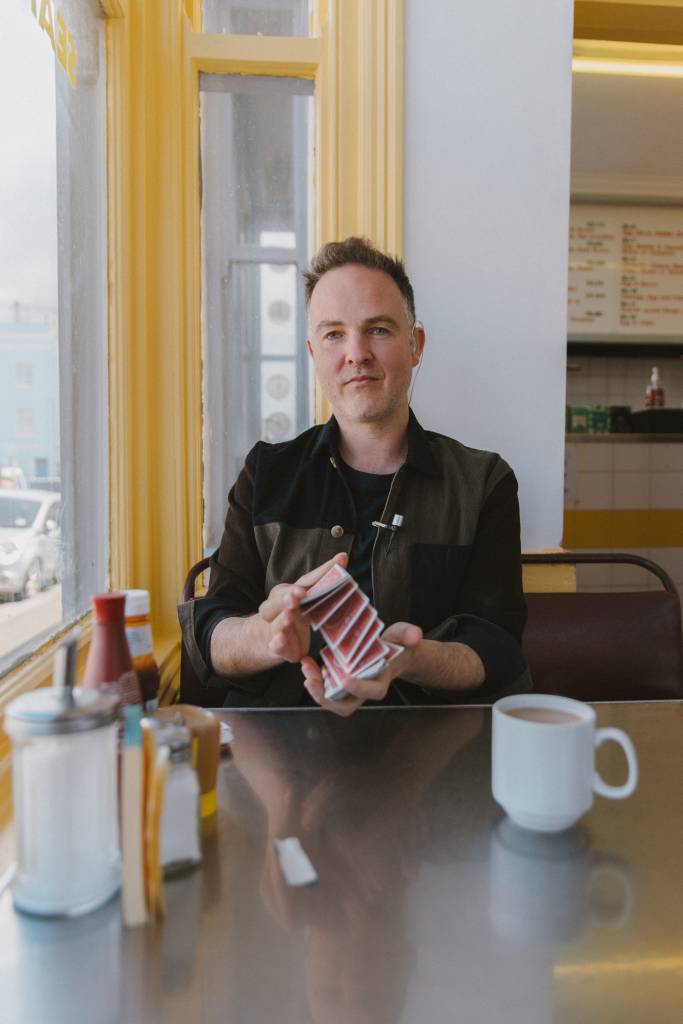MAGIC & MYSTERY
STORIES | What draws us to magic shows?
Our Programme Stories help you explore routes through the Festival, bringing together shows and events that share common themes.
MAGIC & MYSTERY is one of our three core stories. This year’s programme encompass a number of magical offerings: intimate one-on-one shows, mind reading and surrealism, inviting our minds to expand on the tangible.
We invited the acclaimed magician Augusto Corrieri (aka Vincent Gambini) to reflect on the enduring appeal of the magic show.
14 March 2025
What draws us to magic shows? That’s an easy one: it’s the magic. We want to experience the seemingly impossible, to witness the laws of physics come undone, and enjoy the feeling of our mind expanding. Fine. But what is magic, and how can we define it? That’s where the troubles begin. If language can be slippery, the word ‘magic’ is as elusive as it gets.
As someone who has studied the art form for several years, I am still baffled by the fact that the word magic has two opposite meanings. On the one hand, it means trickery and deception: for example, we all know those white rabbits aren’t really appearing out of nowhere. It may be clever, but it’s ultimately a trick, a lie, or a scam, even: magic is never far from the world of con artists and swindlers.
On the other hand – and this is where the troubles begin – magic can mean the opposite of trickery: magic is genuine mystery, events that defy a simple explanation and point towards a different type of reality, one we cannot easily perceive or access. Think of ghosts, fairies and gods. In this sense of the word, magic is not far from the sacred and the spiritual: shamans perform magical rituals to contact their ancestors, or to connect with the single life-force that binds plants, animals, humans and landscapes…
Perhaps what draws us to magic shows is the way both meanings of the word magic – the simple trick, and the cosmic mystery – go hand in hand, to the point that we cannot easily tell one kind of magic apart from the other. Take, for example, Gandini Juggling’s show Heka: are we really sure, when the performers’ hands multiply in uncanny ways, that it’s all just a trick? We know the skilled performers have practiced, and those sleeves look a tad suspicious; but as hands and objects vanish and transmute, we feel a genuine sense of awe and bewilderment, as though we’re witnessing a ritual of transformation, or an ancient dream.
Or take the mind reading antics of Alex McAleer: if the magician can intuit a word or a number that we have merely thought of, then our whole understanding of consciousness is upended; do we all, in fact, share one mind? Could it be that “my thoughts” are really part of a larger consciousness? It’s a somewhat unnerving prospect, and though the performer makes no claims to possess any magical powers, this style of performance reminds us that the mind extends far beyond our private thoughts.
In these shows it’s as though the laws of physics and common sense have been breached… except that of course those laws are all very much intact – we’re in the theatre, after all, a relatively secure space in which to entertain alternatives to reality as we know it.
In other examples from this year’s festival, the theatre itself is stretched and broken up, revealed to be its own kind of illusory construction. My own show – Close-up by Vincent Gambini (a pseudonym) – is a one-to-one performance that takes place inside a café space. Wearing a pair of headphones, each spectator is invited to imagine we’re on a film-set: in fact, the surrounding people in the café may or may not be background actors, and the objects on the table may or may not be what they seem… The lines between theatre and everyday life blur a little, as though what we call reality is in fact a type of illusion.
In all these examples, magic is both a mere trick and life’s mystery. In fact, I would say magic defies simple polar opposites. To experience magic is to remember that life is far more fluid and perplexing than we assume, and this is what draws us to the shows. It probably doesn’t matter whether the magician is a charlatan or a mystic, a trickster or an artist: when we experience magic, words fail us, certainties crumble; we try to clutch at an explanation, to make sense of what we’re seeing – “It’s just a trick!” or, conversely “No! It must be real magic!” – but alas, nothing sticks. In the end, we simply do not know. And that’s what the magicians are here to remind us of.
Written by Augusto Corrieri

‘To experience magic is to remember that life is far more fluid and perplexing than we assume’ – Vincent Gambini